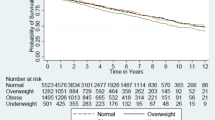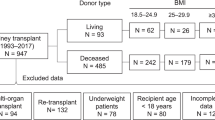Abstract
Background
Obesity is a risk factor for poor transplant outcomes in the adult population. The effect of pre-transplant weight on pediatric kidney transplantation is conflicting in the existing literature.
Methods
Data was collected from the Organ Procurement and Transplantation Network (OPTN) database on recipients aged 2–21 years who received a kidney-only transplant from 1987 to 2017. Recipients were categorized into underweight, normal, overweight, and obese cohorts. Using adjusted regression models, the relationship between recipient weight and various graft outcomes (delayed graft function [DGF], acute rejection, prolonged hospitalization, graft failure, mortality) was examined.
Results
18,261 transplant recipients (mean age 14.1 ± 5.5 years) were included, of which 8.7% were underweight, 14.8% were overweight, and 15% were obese. Obesity was associated with greater odds of DGF (OR 1.3 95% CI 1.13–1.49, p < 0.001), acute rejection (OR 1.23 95% CI 1.06–1.43, p < 0.01), and prolonged hospitalization (OR 1.35 95% CI 1.17–1.54, p < 0.001) as well as greater hazard of graft failure (HR 1.13 95% CI 1.05–1.22, p = 0.001) and mortality (HR 1.19 95% CI 1.05–1.35, p < 0.01). The overweight cohort had an increased risk of graft failure (HR 1.08 95% CI 1.001–1.16, p = 0.048) and increased odds of DGF (OR 1.2 95% CI 1.04–1.38, p = 0.01) and acute rejection (OR 1.18 95% CI 1.01–1.38, p = 0.04). When stratified by age group, the increased risk was realized among younger and older age groups for obese and overweight. Underweight had lower risk of 1-year graft failure (HR 0.82 95% CI 0.71–0.94, p < 0.01), overall graft failure in the 13–17-yr. age group (HR 0.84 95% CI 0.72–0.99, p = 0.03) and acute rejection in the 2–5-yr. age group (OR 0.24 95% CI 0.09–0.66, p < 0.01).
Conclusion
Pre-transplant weight status and age impact pediatric kidney transplant outcomes. Recipient underweight status seems to be protective against adverse outcomes while overweight and obesity may lead to poorer graft and patient outcomes.



Similar content being viewed by others
References
Ogden CL, Carroll MD, Flegal KM (2015) Prevalence of obesity among adults and youth: United States, 2011-2014. National Center for Health Statistics, Hyattsville, MD
Hanevold CD, Ho PL, Talley L, Mitsnefes MM (2005) Obesity and renal transplant outcome: a report of the North American Pediatric Renal Transplant Cooperative Study. Pediatrics 115:352–356
Pi-Sunyer FX (1991) Health implications of obesity. Am J Clin Nutr 53:1595S–1603S
Park D, Lee JH, Han S (2017) Underweight: another risk factor for cardiovascular disease?: a cross-sectional 2013 Behavioral Risk Factor Surveillance System (BRFSS) study of 491,773 individuals in the USA. Medicine 96:e8769
Vestberg D, Rosengren A, Eeg-Olofsson K, Miftaraj M, Franzen S, Svensson AM, Lind M (2018) Body mass index as a risk factor for coronary events and mortality in patients with type 1 diabetes. Open Heart 5:e000727
Wake M, Clifford SA, Patton GC, Waters E, Williams J, Canterford L, Carlin JB (2013) Morbidity patterns among the underweight, overweight and obese between 2 and 18 years: population-based cross-sectional analyses. Int J Obes 37:86–93
Armstrong KA, Campbell SB, Hawley CM, Johnson DW, Isbel NM (2005) Impact of obesity on renal transplant outcomes. Nephrology 10:405–413
Baum CL (2001) Weight gain and cardiovascular risk after organ transplantation. JPEN J Parenter Enteral Nutr 25:114–119
Chang SH, Coates PT, McDonald SP (2007) Effects of body mass index at transplant on outcomes of kidney transplantation. Transplantation 84:981–987
Glanton CW, Kao TC, Cruess D, Agodoa LY, Abbott KC (2003) Impact of renal transplantation on survival in end-stage renal disease patients with elevated body mass index. Kidney Int 63:647–653
Gore JL, Pham PT, Danovitch GM, Wilkinson AH, Rosenthal JT, Lipshutz GS, Singer JS (2006) Obesity and outcome following renal transplantation. Am J Transplant 6:357–363
Howard RJ, Thai VB, Patton PR, Hemming AW, Reed AI, Van der Werf WJ, Fujita S, Karlix JL, Scornik JC (2002) Obesity does not portend a bad outcome for kidney transplant recipients. Transplantation 73:53–55
Johnson DW, Isbel NM, Brown AM, Kay TD, Franzen K, Hawley CM, Campbell SB, Wall D, Griffin A, Nicol DL (2002) The effect of obesity on renal transplant outcomes. Transplantation 74:675–681
Lafranca JA, IJ JN, Betjes MG, Dor FJ (2015) Body mass index and outcome in renal transplant recipients: a systematic review and meta-analysis. BMC Med 13:111
Meier-Kriesche HU, Arndorfer JA, Kaplan B (2002) The impact of body mass index on renal transplant outcomes: a significant independent risk factor for graft failure and patient death. Transplantation 73:70–74
Nicoletto BB, Fonseca NK, Manfro RC, Goncalves LF, Leitao CB, Souza GC (2014) Effects of obesity on kidney transplantation outcomes: a systematic review and meta-analysis. Transplantation 98:167–176
Sancho A, Avila A, Gavela E, Beltran S, Fernandez-Najera JE, Molina P, Crespo JF, Pallardo LM (2007) Effect of overweight on kidney transplantation outcome. Transplant Proc 39:2202–2204
Dick AAS, Hansen RN, Montenovo MI, Healey PJ, Smith JM (2017) Body mass index as a predictor of outcomes among pediatric kidney transplant recipient. Pediatr Transplant. https://doi.org/10.1111/petr.12992
Winnicki E, Dharmar M, Tancredi DJ, Nguyen S, Butani L (2018) Effect of BMI on allograft function and survival in pediatric renal transplant recipients. Pediatr Nephrol 33:1429–1435
Organ Procurement & Transplantation Network (2018) Department of Health and Human Services, Health Resources and Services Administration, Healthcare Systems Bureau, Division of Transplantation, Rockville, MD; United Network for Organ Sharing, Richmond, VA; Data as of April, 2018
(May 30, 2000) Centers for Disease Control and Prevention. CDC growth charts: United States http://www.cdc.gov/growthcharts/
Baum CL, Thielke K, Westin E, Kogan E, Cicalese L, Benedetti E (2002) Predictors of weight gain and cardiovascular risk in a cohort of racially diverse kidney transplant recipients. Nutrition 18:139–146
Mitsnefes MM, Khoury P, McEnery PT (2002) Body mass index and allograft function in pediatric renal transplantation. Pediatr Nephrol 17:535–539
Clapp EL, Bevington A, Smith AC (2012) Exercise for children with chronic kidney disease and end-stage renal disease. Pediatr Nephrol 27:165–172
Kelly AS, Barlow SE, Rao G, Inge TH, Hayman LL, Steinberger J, Urbina EM, Ewing LJ, Daniels SR, American Heart Association Atherosclerosis H, Obesity in the Young Committee of the Council on Cardiovascular Disease in the Young CoNPA, Metabolism, Council on Clinical C (2013) Severe obesity in children and adolescents: identification, associated health risks, and treatment approaches: a scientific statement from the American Heart Association. Circulation 128:1689–1712
Pinto H, Leal R, Rodrigues L, Santos L, Romaozinho C, Macario F, Alves R, Bastos C, Roseiro A, Costa F, Campos M, Mota A, Figueiredo A (2017) Surgical complications in early post-transplant kidney recipients. Transplant Proc 49:821–823
Kaplan B, Gaston RS, Meier-Kriesche HU, Bloom RD, Shaw LM (2010) Mycophenolic acid exposure in high- and low-weight renal transplant patients after dosing with mycophenolate mofetil in the Opticept trial. Ther Drug Monit 32:224–227
Ladhani M, Lade S, Alexander SI, Baur LA, Clayton PA, McDonald S, Craig JC, Wong G (2017) Obesity in pediatric kidney transplant recipients and the risks of acute rejection, graft loss and death. Pediatr Nephrol 32:1443–1450
Ku E, Glidden DV, Hsu CY, Portale AA, Grimes B, Johansen KL (2016) Association of body mass index with patient-centered outcomes in children with ESRD. J Am Soc Nephrol 27:551–558
Naik AS, Sakhuja A, Cibrik DM, Ojo AO, Samaniego-Picota MD, Lentine KL (2016) The impact of obesity on allograft failure after kidney transplantation: a competing risks analysis. Transplantation 100:1963–1969
Hill CJ, Courtney AE, Cardwell CR, Maxwell AP, Lucarelli G, Veroux M, Furriel F, Cannon RM, Hoogeveen EK, Doshi M, McCaughan JA (2015) Recipient obesity and outcomes after kidney transplantation: a systematic review and meta-analysis. Nephrol Dial Transplant 30:1403–1411
Kwan JM, Hajjiri Z, Metwally A, Finn PW, Perkins DL (2016) Effect of the obesity epidemic on kidney transplantation: obesity is independent of diabetes as a risk factor for adverse renal transplant outcomes. PLoS One 11
Acknowledgements
This work was supported in part by Health Resources and Services Administration contract 234-2005-37011C. The content is the responsibility of the authors alone and does not necessarily reflect the views or policies of the Department of Health and Human Services, nor does mention of trade names, commercial products, or organizations imply endorsement by the U.S. Government.
Author information
Authors and Affiliations
Contributions
K.K contributed to data analysis and writing of the manuscript. D.J. contributed to study design, performance of the research, data analysis, and writing of the manuscript. C.S. contributed to the study design, data analysis, writing of the manuscript, and supervision of the research. P.S., R.F., L.I., L.C, L.T, E.M, E.G., and A.F. contributed to the study concept and writing of the manuscript.
Corresponding author
Ethics declarations
The study did not require review by the Institutional Review Board of Northwell Health as it did not meet criteria for human subject research.
Conflict of interest
The authors report no conflicts of interest.
Additional information
Kiranjot Kaur and Daniel Jun are Co-first Authors
Electronic supplementary material
ESM 1
(DOCX 64 kb)
Rights and permissions
About this article
Cite this article
Kaur, K., Jun, D., Grodstein, E. et al. Outcomes of underweight, overweight, and obese pediatric kidney transplant recipients. Pediatr Nephrol 33, 2353–2362 (2018). https://doi.org/10.1007/s00467-018-4038-8
Received:
Revised:
Accepted:
Published:
Issue Date:
DOI: https://doi.org/10.1007/s00467-018-4038-8




